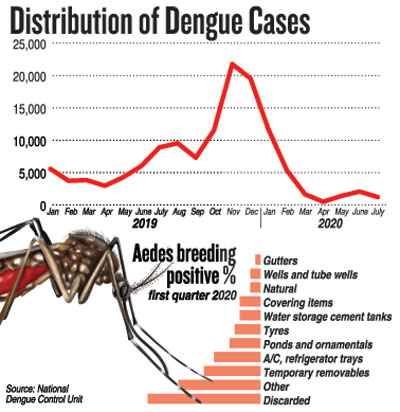News
Dengue delinquents will be stung in their wallets
Dengue mosquito breeders, beware: you will be spot-fined if your house or land is found to be encouraging the breeding of the deadly mosquitoes that have claimed 23 lives and made over 20,000 people – including children – ill this year.
In a desperate attempt to control the spread of dengue, health authorities will bring in a spot fine of up to Rs. 5,000 under the Prevention of Mosquito Breeding Act of 2007.
 “As dengue continues to be a major public health concern and the only preventive mechanism is to keep the surrounding environment clean and free of potential mosquito breeding sites, we were compelled to strengthen the laws against violators,” Dr. Anura Jayasekara, Director of the Health Ministry’s Dengue Control Unit said.
“As dengue continues to be a major public health concern and the only preventive mechanism is to keep the surrounding environment clean and free of potential mosquito breeding sites, we were compelled to strengthen the laws against violators,” Dr. Anura Jayasekara, Director of the Health Ministry’s Dengue Control Unit said.
The necessary amendments, including spot fines, were compiled by the health ministry’s Legal Department and sent to the Legal Draftsman. The spot fines were brought in on the recommendation of the Director-General of Health, Dr. Anil Jasinghe.
“Once parliament is convened, this will be made into law without delay,” Dr. Jayasekera said. “It will be mandatory to have a minimum of two officers present at the time the violator is fined. A receipt will be issued by the Medical Officer of Health (MoH) or the Public Health Inspector, and payments will have to be done at the MoH office.”
Bigger culprits will face both the spot fine and legal action that could lead to a higher value penalty or jail term. The owners or current residents will have to pay the fine.
While Colombo, Gampaha, Kandy, Ratnapura, Trincomalee and Batticaloa lead with high number of cases, this month shows an increasing trend in Kaduwela MoH area in Colombo district, Udunuwara, Wattegama and Yatinuwara areas in Kandy and Kuruvita, Ayagama and Elapatha areas in Ratnapura, the health ministry said.
Top breeding spots are discarded items, followed by temporary erections, air conditioners and refrigerator trays, tyres, cement tanks, covers such as tarpaulins, certain plants and trees, wells and tube wells, gutters, concrete slabs and water storage containers.
“Dengue cases usually rise after the rains as water stagnates,” Dr. Jayasekara warned. “The public has to be vigilant in the coming weeks.” Last year, close to 100 people died of dengue fever.
Dengue causes flu-like symptoms and lasts for two to seven days and is accompanied by high fever (about 40 degrees) with headaches, pain behind the eyes, nausea, vomiting swollen glands, joint, bone or muscle pains and sometimes a rash.
Severe symptoms that include intense abdominal pain, persistent vomiting; bleeding gums, vomiting blood, rapid breathing and fatigue or restlessness, require immediate medical treatment.

